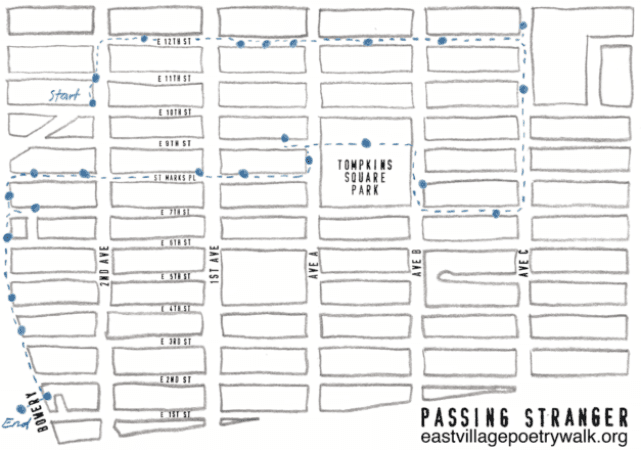Passing Stranger: Poetry in NYC’s East Village
The East Village of New York City has a long history in the counterculture. Now it is pretty thoroughly gentrified, but it still carries echoes of its squalid 1980s glory as a capital of the punk scene. Yet long before that, the East Village was a vigorous and diverse community of poets. From rundown old tenements to the charming old St. Marks Church — which has housed the Poetry Project since 1966 —the East Village has been hospitable to poets including Allen Ginsberg, Frank O’Hara, Ted Berrigan, and Anne Waldman.
The lack of landmarks to poetry is one of the things that appealed to Pejk Malinovski, a Danish poet, translator, and sound artist who has spent years producing Passing Stranger, an audio walk of poetry’s history and presence in the East Village.
(Pejk is also a former producer of Studio 360. Among his stories for the program are “Waiting for Godot in New Jersey,” a portrait of an actors’ retirement home; a journey to Japan’s “suicide forest“; and aboat ridewith his fellow Dane, art star Olafur Eliasson.)
This is an audio tour with the richness and density of a documentary, full of characters, sounds, and memories, so that it will reward a good listen even if you can’t get to New York. At St. Marks Church, we hear the “benefit shooting” of 1968, when Allen Van Newkirk and some fellow anarchists interrupted Kenneth Koch with a fake gun, seizing poetry for the revolution. You can hear the blanks being fired, and Koch dismissing them (“Get out. Grow up.”) while Ron Padgett, who was in the audience, recalls the event:
And there’s a stop at theBowery Poetry Club, where a Lite-Brite picture of Walt Whitman glows eternally above the stage. It’s a surprisingly well-realized portrait: detailed and quite large with little pins of light in red, white and blue.
Still, it’s on the street thatPassing Strangerrealizes what many poets of the 60s and 70s most valued: making poetry part of the everyday. Critic and poet David Lehman expresses this when he discusses Frank O’Hara: “[He] liked to think that poetry was continuous with living, it was that something you did as part of your life. You could do it in a crowded room, you could do it on the subway or on the way to a party. You could do itatthe party.” When I walked by PS 61 on East 12th near Avenue B, where Kenneth Koch taught, recess had exploded into the schoolyard, and the shrieks and yells of the kids blended in with the tour’s archival recording of children reading their poems in Koch’s class. “I wish I was a chocolate-covered flying horse.” “I wish I was a bird so I could tell the other birds to be quiet.” “I wish a giant ice cream cone would fall out of the sky and crush the school.”
The narration is by filmmaker Jim Jarmusch, with perfectly timed walking directions read by WNYC’s Kaari Pitkin. “Watch out for cars — they come in both directions here,” she warns helpfully; at one point, thoroughly engrossed, I nearly walked into traffic.
Here Jarmusch explains the influences behind Walt Whitman’s writing and we hear his poem — and the title of the poetry walk — Passing Stranger:
Passing Stranger: The East Village Poetry Walkis available for download, and there is an interactive audio map on thewebsite.
The World is an independent newsroom. We’re not funded by billionaires; instead, we rely on readers and listeners like you. As a listener, you’re a crucial part of our team and our global community. Your support is vital to running our nonprofit newsroom, and we can’t do this work without you. Will you support The World with a gift today? Donations made between now and Dec. 31 will be matched 1:1. Thanks for investing in our work!
